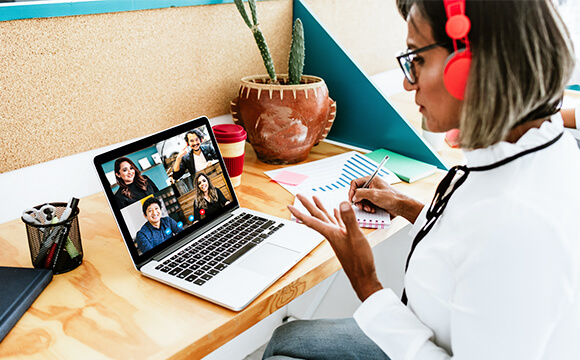How to be a better ally to your colleagues

Many people want to show up for their marginalised colleagues, but don’t know where to start, or if they’re doing it right.
From changing your approach, educating yourself, carrying out microaffirmations, and using your privilege; here’s how can you be a better ally at work.
What is allyship?
Allyship at work is about taking responsibility to support your colleagues, customers, and network who have a different identity to you. Allies endeavour to drive systemic improvements to workplace policies, practices, and culture to create a more equal world.
This might be supporting your colleagues who are LGBTQIA+, minoritised ethnic, disabled, or neurodiverse. You may wish to support them on a personal level or carry out more public acts of sponsorship and advocacy. And although all of this can seem intimidating, even small acts of allyship can make a big difference. Forbes suggests: “one barrier on the path towards progress may be that individual employees are underestimating their own power when it comes to creating real culture change.”
Change how you approach allyship
You might think that in order to stop racism you just need to not be racist, to stop homophobia you need to not be homophobic, and to create gender equality you just need to not be sexist. But that’s a very passive way to approach diversity, equity and inclusion. After all, simply not being something doesn’t prompt any action or change and is much easier than standing for something or someone.
To be a true ally, you need to be anti-racist, anti-homophic, and feminist. You need to actively work against the structures, institutions, and cultural traditions that hold back the progress towards equality for all. Think of it like driving: in order to get to where you’re going, you can’t simply stop driving in the wrong direction. You also have to turn around and drive towards your destination. It’s an involved process, not a passive one.
Employees are underestimating their own power when it comes to creating real culture change.
Education
Learning about the people and communities you’re wanting to help is a natural and essential first step to allyship. And you want to make sure you go to the source – i.e. learn from the people themselves, not an irrelevant spokesperson talking about another group of people.
Now, it might be tempting to go to your nearest and dearest friend of the community you’re wanting to learn more about and ask them about their experiences of inequality. But it shouldn’t be their responsibility to educate you. Imagine if you were just having your lunch and Dave from IT comes up to you and asks you about the slave trade – I doubt you’d want to discuss that either, particularly when unprepared and halfway through a pasta salad.
After all, there are thousands of resources to gain different perspectives, stories and views. Books, podcasts, TV documentaries, independent news outlets, and YouTube essays are just a few ways you can learn more.
If you’re not sure where to start, the history of systemic racism, sexism, homophobia, and ableism will lay the groundwork. And then building upon that with current issues and ideologies to see what’s being talked about today. Media analysis can be a great way to get into these current topics in a more approachable way.
Workplace also suggest starting with what you find most uncomfortable. That’s a good indication you have a lot to unpack and could be the areas that need the most work.
Just note that educating yourself on inequality is never finished. You can never complete the homework. It’s a continual process of learning (and unlearning) done over a lifetime.
Don’t assume you know what people want or need
When trying to be a better ally, you may have an idea of what you think people need, perhaps based on what you learnt when educating yourself. However, what people want in terms of allyship changes depending on the situation, their background and culture, and on an individual level. So really, you won’t know what they want unless you ask!
For example: “What do you think our business can do to promote inclusion?”, “Do you need any tools to help you do your job better?”, “What do you want from a colleague network?”, “Have you noticed any inequality in the business, and if so, do you have any ideas of how to eradicate them?”
This was true when setting up our own internal LGBTQIA+ network, Moore Visibility. When we started, I presumed people would want a confidential community to raise issues and share concerns or ideas to improve inclusion in our business. But really, what our network members mainly wanted was a chance to socialise with fellow LGBTQIA+ people in the business. And so that’s what we’re focusing on going forward.
Plus, asking people’s opinion is often an act of allyship itself. You’re saying: “I recognise you might have different needs, and I want to help,” which in itself is a powerful message even if there’s nothing to be done at that time.
Listen
Listening openly to others without judgement, particularly those who share very different opinions to yours, is a big part of being a stand-up ally (and human being).
Try to be as humble, open, and empathetic as possible. And never diminish someone’s experience just because you’ve not had a similar one, like saying, “I’m surprised you think George is sexist, he’s always been lovely to me.” (Sounds silly but it’s a common pitfall in these kinds of conversations.)
Asking “What can I do to help?” as above might give some useful information. But long-term, listening can reveal more insights to understand the individual’s needs and perspective.
Remember that no-one can speak for their whole community, they are still just one perspective. But their own lived experiences may indicate how others are treated, or a wider trend. It’s therefore important to talk to as many people as you can to get a more holistic picture.
Microaffirmations
Many people in minority communities will experience microaggressions – which are small verbal and non-verbal communications from other people that diminish their experiences, identities and beliefs, or perpetuate stereotypes.
But Ideas.ted.com have introduced the concept of “microaffirmations” which are the opposite. These are small ways you can instead show up for your colleagues by affirming their identity and acknowledging their experiences and expertise in the moment. These include techniques such as mirroring how someone describes themselves, acknowledging religious holidays, and encouraging participation.
Use your privilege
Privilege is a very important tool in allyship, because leveraging the advantages you have in work (and life in general) can give people without them better opportunities, and drive change.
Many people don’t like to admit that they have privilege, usually because they think it diminishes the hard work they’ve put into getting where they are. But everyone has some form of privilege, whether that’s being able-bodied, college-educated, male, white, heterosexual, cis, or neurotypical. Whether you admit it or not, the more of these you have, the fewer obstacles you’re likely to have in life. To be a better ally, you have to be able to acknowledge the privilege you have. And once you have, it can be the most powerful tool at your disposal in allyship.
For example, as a neurotypical person, you could help someone with dyslexia to write and proof-read their job application. If you’re a man, and you’ve noticed your colleagues who are women don’t get as much airtime in meetings as the men, you could make a point of giving them a generous time slot in the next one, or supporting their ideas.
Keep trying
Many people, especially those in the majority, want to help, but are so paralysed by fear of doing something wrong that they do nothing at all, which is of course not helpful to anyone. So don’t let your fear stop you from continuing to try and do the right thing.
If you have good intentions and are willing to listen and learn, other people will appreciate you making the effort, even if you occasionally make mistakes. (On the flip side of this, it’s usually very obvious – and uncomfortable! – when someone is going out of their way to avoid issues or language they’re unsure about.) Everyone is human and makes mistakes; every reasonable person will know that and forgive you for it. So, keep trying to do the right thing, learning along the way, and no matter what mistakes you make, you will still make a big positive impact overall.
What next?
Equality is a far-off milestone and we’re definitely not there yet. But the more people there are stumbling towards that goal, the more likely we are to get there. So use this advice, show up and speak up for your colleagues, be part of progress, and become an ally.




